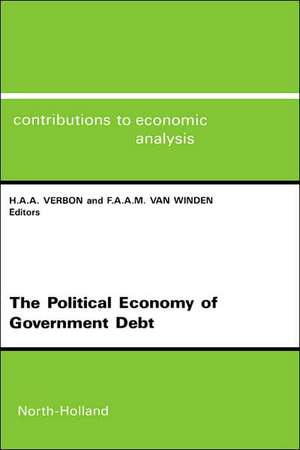Political Economy of Government Debt – Symposium : Revised Papers: Contributions to Economic Analysis
Autor H.a.a. Verbon, F.a.a.m. Van Windenen Limba Engleză Hardback – 13 iul 1993
Din seria Contributions to Economic Analysis
- 9%
 Preț: 802.42 lei
Preț: 802.42 lei - 23%
 Preț: 1071.35 lei
Preț: 1071.35 lei - 23%
 Preț: 1023.59 lei
Preț: 1023.59 lei - 23%
 Preț: 932.12 lei
Preț: 932.12 lei - 23%
 Preț: 1258.06 lei
Preț: 1258.06 lei - 23%
 Preț: 1125.47 lei
Preț: 1125.47 lei - 23%
 Preț: 1072.71 lei
Preț: 1072.71 lei - 23%
 Preț: 1134.25 lei
Preț: 1134.25 lei - 23%
 Preț: 1025.01 lei
Preț: 1025.01 lei - 23%
 Preț: 928.43 lei
Preț: 928.43 lei - 23%
 Preț: 1327.58 lei
Preț: 1327.58 lei - 23%
 Preț: 1090.22 lei
Preț: 1090.22 lei - 23%
 Preț: 928.84 lei
Preț: 928.84 lei - 23%
 Preț: 1061.82 lei
Preț: 1061.82 lei - 23%
 Preț: 1113.58 lei
Preț: 1113.58 lei - 23%
 Preț: 874.46 lei
Preț: 874.46 lei - 19%
 Preț: 673.76 lei
Preț: 673.76 lei -
 Preț: 333.43 lei
Preț: 333.43 lei - 23%
 Preț: 1264.34 lei
Preț: 1264.34 lei - 23%
 Preț: 1323.45 lei
Preț: 1323.45 lei - 23%
 Preț: 1261.24 lei
Preț: 1261.24 lei - 23%
 Preț: 1099.44 lei
Preț: 1099.44 lei - 23%
 Preț: 1149.25 lei
Preț: 1149.25 lei - 23%
 Preț: 836.47 lei
Preț: 836.47 lei - 23%
 Preț: 854.99 lei
Preț: 854.99 lei - 23%
 Preț: 1125.37 lei
Preț: 1125.37 lei - 23%
 Preț: 932.57 lei
Preț: 932.57 lei - 23%
 Preț: 1266.20 lei
Preț: 1266.20 lei - 23%
 Preț: 1018.90 lei
Preț: 1018.90 lei - 23%
 Preț: 1204.17 lei
Preț: 1204.17 lei - 23%
 Preț: 1398.42 lei
Preț: 1398.42 lei - 23%
 Preț: 1299.72 lei
Preț: 1299.72 lei - 23%
 Preț: 1221.55 lei
Preț: 1221.55 lei - 23%
 Preț: 1134.89 lei
Preț: 1134.89 lei - 23%
 Preț: 928.43 lei
Preț: 928.43 lei - 23%
 Preț: 930.35 lei
Preț: 930.35 lei - 23%
 Preț: 1028.12 lei
Preț: 1028.12 lei - 23%
 Preț: 895.88 lei
Preț: 895.88 lei - 23%
 Preț: 1096.14 lei
Preț: 1096.14 lei - 23%
 Preț: 999.71 lei
Preț: 999.71 lei - 23%
 Preț: 1052.38 lei
Preț: 1052.38 lei - 23%
 Preț: 1045.56 lei
Preț: 1045.56 lei - 23%
 Preț: 1255.61 lei
Preț: 1255.61 lei - 23%
 Preț: 1076.51 lei
Preț: 1076.51 lei - 23%
 Preț: 1042.59 lei
Preț: 1042.59 lei
Preț: 1196.60 lei
Preț vechi: 1554.03 lei
-23% Nou
Puncte Express: 1795
Preț estimativ în valută:
228.100€ • 248.66$ • 192.36£
228.100€ • 248.66$ • 192.36£
Carte tipărită la comandă
Livrare economică 22 aprilie-06 mai
Preluare comenzi: 021 569.72.76
Specificații
ISBN-13: 9780444890528
ISBN-10: 0444890521
Pagini: 340
Dimensiuni: 155 x 234 x 559 mm
Greutate: 0.65 kg
Ediția:New.
Editura: Emerald Publishing
Seria Contributions to Economic Analysis
ISBN-10: 0444890521
Pagini: 340
Dimensiuni: 155 x 234 x 559 mm
Greutate: 0.65 kg
Ediția:New.
Editura: Emerald Publishing
Seria Contributions to Economic Analysis
Cuprins
THEORETICAL ISSUES. The Political Economy of Government Debt: A Survey. (B. van Velthoven, H. Verbon, F. van Winden). Introduction. The Intertemporal Government Budget Constraint. The Effects of Government Debt. Positive Theories of Public Debt. Long Term Debt Strategy: A Survey. (R. Boadway, D. Wildasin). Introduction. Characterizing Public Debt. The Effect of Public Debt on the Economy. Normative Aspects of Debt Policy. Concluding Remarks. The Politics of Intergenerational Redistribution. (G. Tabellini). Introduction. The Model. The Economic Equilibrium. Voting on Debt Repudiation. Equilibrium Intergenerational Redistribution. Concluding Remarks. Social Security and the Deficit in the US: A Political Economy Approach. (A. Cukierman). Introduction. Social Security and the Budget: Some Background Facts. The 1983 SS Fixup and the Role of the Trust Fund as a Commitment Device. A Model of Congressional Behavior with Respect to SS and the Rest of the Budget. Interpretation of Past Events in Light of the Model and its Implications for the Current Policy Debate and the Future. Concluding Reflections. Endogenous Technology, Budgetary Regimes and Public Debt. (C. van Ewijk, T. van de Klundert). Introduction. Endogenous Technical Change. Private and Public Production of Technology. Macroeconomic Model. Fiscal Policy, Productivity Growth and Budgetary Regimes. Choice of Regime: Some Political Aspects. Conclusion. Economic and Monetary Union in Europe and Constraints on National Budgetary Policies. (L. Bovenberg, J. Kremers, P. Masson). Introduction. EMU: A New Environment for Budgetary Policy. Monetary Union and Prospects for Budget Discipline. Intergenerational Equity and Intertemporal Efficiency. Stabilization Policy. Concluding Comments. Monetary Discipline and the Real Value of Government Debt: The Case for an Independent Eurofed. (F. van der Ploeg). Introduction. Competition among the Treasuries and Central Banks of a Monetary Union. European Monetary Union with an Independent Central Bank. Reasons for Joining the EMS. Conclusion. EMPIRICAL APPLICATIONS. The Determinants of the Ricardian Equivalence in the OECD Countries. (S. Perelman, P. Pestieau). Introduction. Testing Ricardian Equivalence with Time-Series Cross-Section Data. Ricardian Equivalence Indicators for Each Country. Conclusions. Debt Neutrality, Finite Horizons, and Private Savings Behavior. (A. Jaeger). Introduction. Public Debt Neutrality in a Finite-Horizon Economy. Debt Neutrality and Private Savings Behavior. Conclusion. Management of the Nominal Public Debt: Theory and Applications. (G. Calvo, P. Guidotti). Introduction. The Model. Public Debt Management: Numerical Simulations. Debt Maturity in Italy, Ireland, and the United States. Concluding Remarks. Interest Rates and Government Debt: Are the Linkages Global rather than National? (V. Tanzi, M. Lutz). Introduction. General Background. The Growth of Public Debt in OECD Countries. Debt and Interest Rates: Empirical Results. Concluding Remarks. Self-Correcting Deficits: A New Lesson in Functional Finance. (R. Eisner, S.-I. Hwang). Introduction. Theory and Hypotheses. Description of Equations. Characteristics of the Models. Conclusions. Positive Theories of Public Debt: Some Evidence for Germany.(J. de Haan, D. Zelhorst). Introduction. The Tax Smoothing Theory of Public Debt. Political Determinants of Government Budget Deficits. Testing the Tax Smoothing Hypothesis of Public Debt for the FRG. Testing for Political Determinants of Government Debt Growth in the FRG. Some Concluding Comments. Suggestions for a New Set of Fiscal Indicators. (O. Blanchard). Introduction. The Uses and Abuses of the CAB. Constructing Indicators: A General Strategy. Indicators of Discretionary Fiscal Policy. Indicators of Sustainability. Indicators of Fiscal Impact on Aggregate Demand. Indicators of Fiscal Distortions. Conclusion and Summary.
















